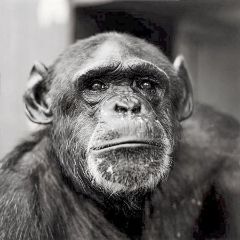PEPPER

1970–2012
The emotions that hit me when I first met Pepper were feelings of deep empathy. Pepper was simply terrified, the look in her eyes, and the way she kept rubbing her hands together, squeezing them and holding her feet up close, trying to protect herself, her tummy, her vulnerable place, really affected me. Pepper was always so scared. It was deeply sad, and life altering. It all felt so terribly wrong, my first and only instinct when I met Pepper, was to let her out.
Spiritual, emotional and always kind…that was Pepper. There are not enough words in the English language to describe how deeply sensitive and emotional this chimpanzee was. She displayed so many of the same emotions as human primates, but she also relied on her intuition and her senses; gifts we as humans so often ignore or don’t trust in ourselves.
Pepper was a family girl. She loved to be with her “people,” to be near her chimpanzee family and to share with them. Being alone was torture for her. Pepper would often visit with humans but her chimpanzee family was never far away. We learned very early that Pepper had a fear of small spaces that was so intense she would shake uncontrollably when locked in a room alone, or even with another individual. Pepper’s fear of small spaces was the driving force behind some of the biggest changes to the chimp house at Fauna. We created openings that were large and crossover areas so Pepper never had to be in a space that was confining and that caused her to panic. Chimpanzees like Pepper, Billy, Annie and Jeannie helped us modify and expand the chimp house into the complex and enriching environment it is today.
“Tenderness and kindness are not signs of weakness and despair, but manifestations of strengths and resolutions.” —Kahlil Gibran
Pepper had preferences and favorite locations and she helped us create her environment by listening to her needs. She knew what foods she liked and was very particular about her fruits and vegetables. All the chimps at Fauna loved her and she had a lot of friends. She was very social and incredibly kind and patient. She knew what she wanted and would wait until she got it, never being lured by anything that did not appeal to her. She was sensible, understanding and, when necessary, someone you could reason with. She was considerate, respectful, loving, supportive, loyal, nurturing and brave. We knew all of this about Pepper very soon after she arrived at Fauna. Surely all of these qualities must have been visible to the researchers, lab technicians and veterinarians who violated and tortured her every day? One would think that if you were that kind and good you would be spared such atrocities, but regardless of personality, no chimpanzee is spared once they enter a research facility. This was Pepper’s fate.
Today, there is substantial proof that the research information we get from chimpanzees and other animal models is virtually useless; their lives lost, suffering and despair, all for nothing. Although research on chimpanzees continues, two of the most influential organizations in the United States responsible for governing this, the National Institute of Health (NIH) and the Institute of Medicine (IOM), have now decided that the use of chimpanzees in research is no longer necessary. They have decided they will stop using and retire all but 50 chimpanzees. For the hundreds that will one day make it to sanctuary, this news is wonderful, but for the last 50…what does the future look like? And why if it is no longer necessary are they choosing to keep 50 behind? No matter how many “improvements” are made, no chimpanzee can live in the lab environment without suffering. No chimpanzee can manage the stress and strain on their body. No chimpanzee can endure a technician shooting him with a dart gun or sticking her with a needle filled with anesthetic, without urinating, defecating or screaming. Not one chimpanzee ever learns to accept this; not one can be trained to endure this each and every time; day after day, year after year. How could they?
That was Pepper’s life. The lab personnel say she was someone who seemed to handle it well and even after all those years she remained kind. I believe them when they say that because Pepper was always kind. But at what cost to her? Because she co-operated they did more to her. She suffered more. That just does not seem fair at all. Who will be the 50 chimpanzees kept behind? Will they be nice like Pepper was? Will they be babies: pure and innocent? Will they grow into traumatized chimpanzees like Pepper or go insane like Jeannie, or become violent and aggressive like Pablo. Who will they choose, and what will become of them in 25 years? Will they have a chance to get away like Pepper did? Shouldn’t they have that opportunity now?
When Pepper came to Fauna in 1997 she was scared, but she was excited for the first time in many, many years. Excited about the future, her day, her friends, her home, her blankets, but most of all, by her choices. She expressed herself, she relaxed, stretched out, no longer bearing witness to, or being a victim of, such cruelty to her kin. She did trust that we would not hurt her, but she really never fully trusted us, until the very end. It took nearly 14 years for her to get there. We miss Pepper every day. We miss her voice, her calls, her love and her energy. We all know she is in the heaven of her kind and she is at peace at last. She deserves this and she did not deserve to suffer at the hands of humans. No chimpanzee does.





